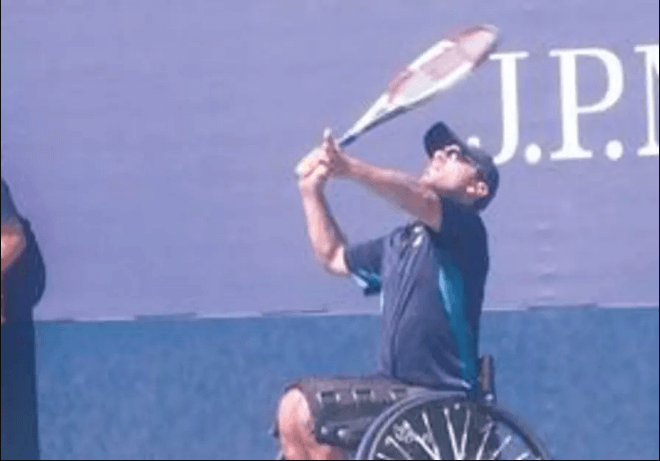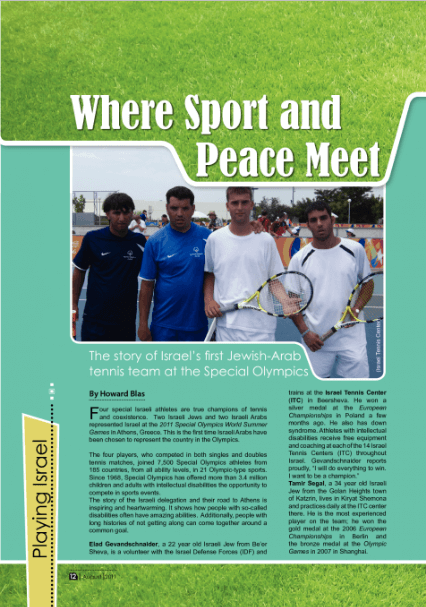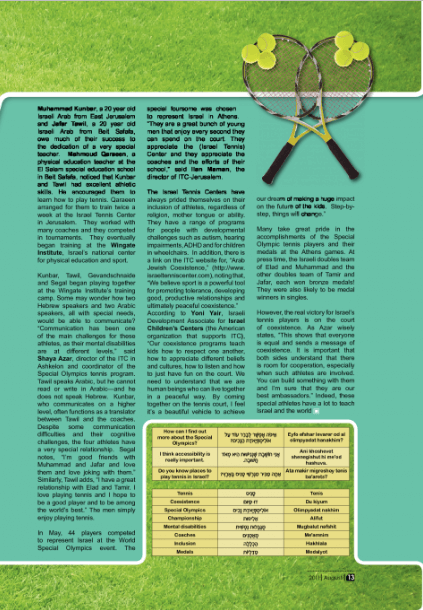Original Article Published On The Jerusalem Post
NEW YORK – Israeli tennis players competed in male and female singles and doubles events in this years recently completed US Open at the USTA Billie Jean King Tennis Center in Flushing Meadows, New York.
Peer, Sela, Ram and Erlich, and their juniors counterparts Patiuk, Ram-Harel and Botzer proudly represented Israel; only Ram-Harel advanced past the second round.
A lesser known Israeli tennis player, Noam Gershony – also Israel’s highest ranked player – participated in the 2011 US Open Wheelchair Competition, in both wheelchair quad singles and doubles.
Gershony, is the third ranked quads singles player in the world and 9th ranked doubles player.
Signs outside the courts informed spectators that “wheelchair tennis began in California in 1976. Since then, it has grown to be played on six of the seven continents (all but Antarctica) and currently there are more than 170 tournaments on the wheelchair professional tour.”
The US Open Wheelchair Division was established in 2005 as one of the premiere wheelchair tennis events in the world.
There are two divisions – wheelchair division and quads division.
Athletes in this first division have disabilities only in their lower extremities.
Quad athletes have disabilities in both lower and upper extremities; they are classified based on disability, rather than by gender.
Quads tennis is therefore one of the only sports where both men and women compete against each other equally.
US Open wheelchair matches are identical to other US Open events –they are played on regulation courts, there is a chair umpire, line judges and ball children.
The only difference from other tennis events is that balls are allowed to bounce up to two times before being returned.
This years US Open Quads featured four top male players, who faced each other over three days in a roundrobin tournament.
On Thursday, Peter Norfolk of Great Britain, ranked No. 1 in the world and nicknamed “The Quadfather,” defeated Nick Taylor of the US, 6-2, 7-5.
Taylor is the defending US Open quad doubles champion and one of the top American wheelchair tennis players in the world.
Gershony, the 24 year old player from Kfar Saba, served as an Apache helicopter pilot in the Israeli Army. Ironically, Gershony reports, he had taken his first tennis lessons (five in total) prior to the crash of his Apache helicopter in 2006 during the Second Lebanon War; the crash left him paralyzed.
Coach Nimrod Bichler, accompanied Gershony to the US Open and has worked with wheelchair tennis players at Beit Halochem in Tel Aviv for the past fifteen years.
In Thursday’s match, Gershony defeated David Wagner of the US, 6-3, 6-1.Wagner is the world’s No. 2 singles player and No. 1 doubles player; his career singles record is 448-72; his doubles record is 299-49.
In a post-match interview, the good natured Gershony reports, “It is always easy being the underdog – there is no expectations and less pressure.”
Gershony attended the 2010 US Open as a spectator.
He spent much of 2011 competing.
He has captured four singles titles, and he has climbed to No. 3 in the world in singles.
“My main goal is to get the points needed to reach the 2012 Paralympics in London, England.”
In Friday’s second-round matches, Wagner defeated Taylor 6-0, 6-2 while Norfolk defeated Gershony, his doubles partner, 7-5, 6-2.
“As usual, he kicked my [butt],” reported the smiling Gershony.
“If I win tomorrow, I get to play him again in two days.”
Saturday’s quads doubles championship was a Wagner/ Taylor walkover victory over Norfolk and Gershony, due to a Norfolk injury.





